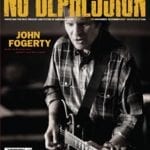Ryan Bingham – Papa was a rodeo
It was on a pivotal night five years ago that Ryan Bingham realized he was destined to be a singer-songwriter. Faced with either fulfilling his regular duties — as a rodeo contestant — or playing a previously scheduled bar gig, he chose the latter. From that point forward, Bingham’s days as a bull rider were numbered.
“One of the things about riding bulls is, if you don’t eat and breathe it, and give it 110 percent, you’re going to end up getting hurt,” says Bingham. “It’s a dangerous sport, and you have to really be focused. If you go at it half-assed, it’s not going to work out too well.
“My heart was much more toward music. I kind of went at music in the same way I did rodeos, with the same type of energy. The lifestyle is pretty much the same. You’re on the road all the time, sleeping in the back of trucks. I was used to that.”
From the start, Bingham’s background prepared him well for the life of a troubadour. He comes from a long line of ranchers; “the cowboy lifestyle is in my blood, going back to my great-grandfather,” he says. He spent his early youth in Hobbs, New Mexico, a small town in the southeastern corner of the state. Before he reached his teens, the family lost the ranch, and his father began shuttling the family all over west Texas. Eventually the Binghams settled in Laredo, just a stone’s throw from the Mexico border. By that time Bingham was well into bull riding, but music gained a foothold in his psyche as well.
“The guy who lived next door to us sat on his porch and played guitar in the afternoons,” Bingham says. “He played old mariachi music. My mom had bought me a guitar a couple of years prior to that, but I had never learned to play it. I was more interested in rodeo.
“But I started hanging out with our neighbor, and he showed me a few chords and taught me to play some mariachi music. From then on, I never put the guitar down. I got tired of just playing mariachi songs, so I started making up songs on my own, just to get away from doing the same thing all the time.”
Eventually Bingham landed in Stephenville, Texas (about 75 miles southwest of Fort Worth), where he began attending a prominent rodeo school. Concurrent with his bull-riding sessions, he became increasingly drawn to the region’s music scene, and he began writing songs in earnest.
“There was a lot of music-related stuff going on,” Bingham recalls. “There were all these young bands doing the small-tour circuit, playing Texas country music. I would go to the bars to watch these guys play. It was mostly just hometown kids making up songs and playing them in roadhouses and honky-tonks. That’s when I started writing songs more, and sort of seeing what that was all about.”
In an effort to juggle bull riding and music, Bingham often played to rodeo audiences who gathered to hear him perform from the tailgate of his pickup. Regular bar gigs ensued, and eventually Bingham ended up in Los Angeles. There, thanks to some admiring patrons, he was introduced to former Black Crowes guitarist Marc Ford. Smitten with Bingham’s songs, Ford suggested the two go into a studio and record a batch of them.
The result, Bingham’s debut album for Lost Highway, bears the hardscrabble markings of someone accustomed to the tough life. Titled Mescalito, the collection veers from rustic campfire balladry to ragged roots-rock that bristles with roadhouse energy. High points include “Southside Of Heaven”, an autobiographical prairie ballad rife with vagabond imagery; “Bread & Water”, a raucous, slide-guitar-driven honky-tonk blues stomp; and “The Other Side”, a midtempo garage-rocker that brings to mind the glory days of Ford’s former band. Throughout, Bingham sings in a weathered rasp that exudes yearning authenticity.
“Some of the guys out of Lubbock, Texas, had a big impact on me,” Bingham says, when asked about his songwriting influences. “Joe Ely, Terry Allen — guys in west Texas who I relate to from having lived in that same part of the world. They don’t seem to limit themselves, or have any rules about writing songs. They’ve inspired me to keep an open mind.”
Bingham goes on to cite Bob Dylan as a primary influence as well. He’s also quick to admit he doesn’t force the issue when it comes to songwriting, adding that his work is deeply entwined with his lifestyle.
“For the most part I take things one day at a time,” he explains. “I might go two or three months without writing a single song, and then sit down one day and write five or six in one sitting — just writing about the experiences I’ve had during the past six months. I try to make the best of what I’ve got. I just want to do good things, and be happy. Having a warm bed and some food on the table — if you’ve got that, things are pretty good.”




